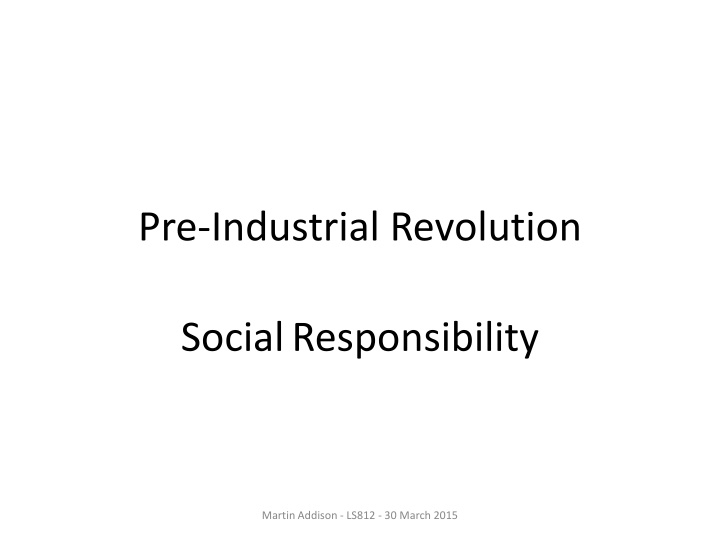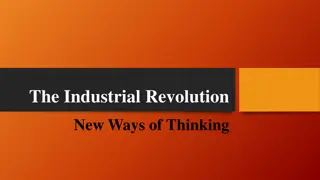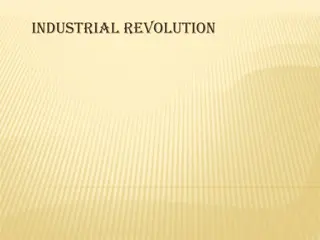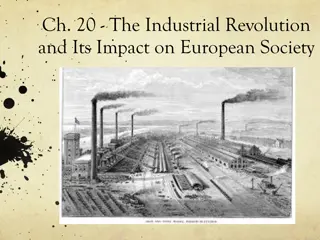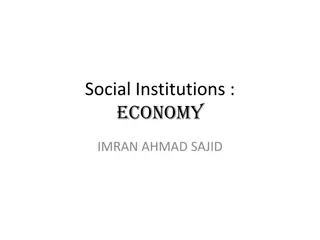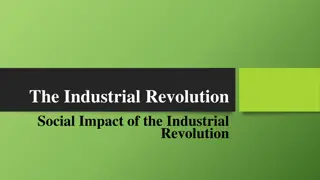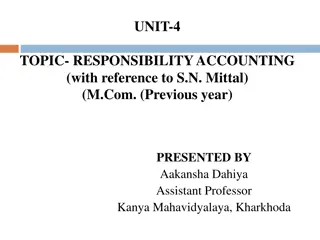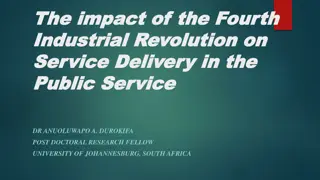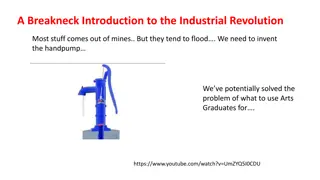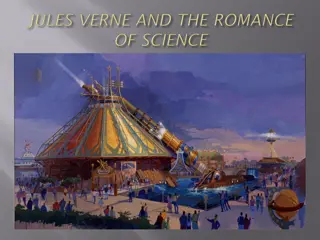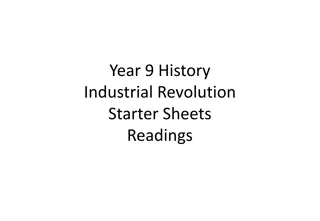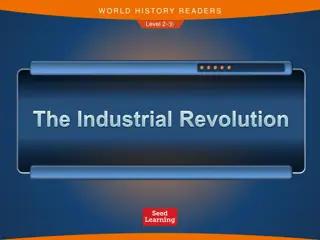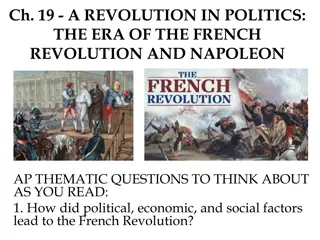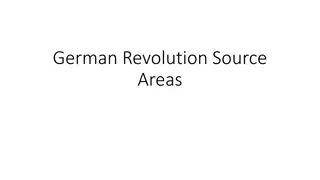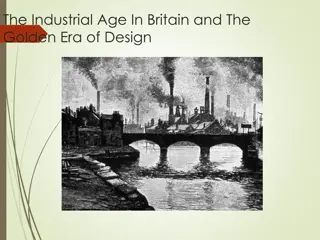Insights into Pre-Industrial Revolution Social Responsibility by Martin Addison
Explore the dynamics of social responsibility in the pre-Industrial Revolution era, contrasting the impact of corporate social responsibility on decision-making processes and organizational outputs. Delve into the complexities of charity, profit, and individual agency within diverse economic frameworks.
Download Presentation

Please find below an Image/Link to download the presentation.
The content on the website is provided AS IS for your information and personal use only. It may not be sold, licensed, or shared on other websites without obtaining consent from the author.If you encounter any issues during the download, it is possible that the publisher has removed the file from their server.
You are allowed to download the files provided on this website for personal or commercial use, subject to the condition that they are used lawfully. All files are the property of their respective owners.
The content on the website is provided AS IS for your information and personal use only. It may not be sold, licensed, or shared on other websites without obtaining consent from the author.
E N D
Presentation Transcript
Pre-Industrial Revolution SocialResponsibility Martin Addison - LS812 - 30 March 2015
No Corporate Social Responsibility Decision-Making A firm focuses on one thing and one thing only - its profit This creates pressure to reduce costs by cutting costs internally The owners, managers and labour make their own personal charity decisions. Is this is more or less democratic than forcing the firm to give? Martin Addison - LS812 - 30 March 2015
The Firm without Corporate Social Responsibility The Law & Governmental Administration Individual Owner Charity Profit Profit The Nation, The Community Charity Individual Manager Charity Profit Customers Profit Profit Suppliers Individual Labour Charity Charity The Firm Martin Addison - LS812 - 30 March 2015
Corporate Social Responsibility Decision-Making A firm giving to charity reduces its ability to reinvest, and its profit This creates pressure to reduce costs by cutting costs internally this essentially represents a tax on labour Do the owners and / or the manager of the firm make the charity decisions? Martin Addison - LS812 - 30 March 2015
The Firm with Corporate Social Responsibility The Law & Governmental Administration Individual Owner Charity Profit Profit The Nation, The Community Charity Individual Manager Charity Profit Customers Charity Profit Profit Suppliers Individual Labour Charity Charity The Firm Martin Addison - LS812 - 30 March 2015
The Protestant Ethic Premise: 1. 2. 3. Therefore: 1. And: 1. Stuff = Money Money = Labour Labour Free Time Stuff Free Time Free Time Stuff Where does charity fit into this equation? Martin Addison - LS812 - 30 March 2015
Self-Interest and Selfishness Fellow Feeling is crucial = sympathy Bi-directional and inter-dependent sense of well-being Self-interest = When you feel good, I feel good The butcher takes care of his own self-interest, but because he is not selfish he takes care of his clientele Not all human actions are selfishly motivated; but he understands that: Altruistic actions are driven by a deep desire within the self; and not by reason alone This applies to all individuals Martin Addison - LS812 - 30 March 2015
Relationship Between the Individual and the Entity Is business as an entity of men really different to the church, academia, military? "Consumption is the sole end and purpose of all production; and the interest of the producer ought to be attended to, only so far as it may be necessary for promoting that of the consumer. Smith: The Wealth of Nations (Page 286) What is the purpose the Church & Academia To fund environmental studies? Homeless shelters? What about negative eud monia Martin Addison - LS812 - 30 March 2015
Relationship Between the Individual and the Entity Structure of laws and administration limit all human endeavours: Lag between innovation and legislation Conversely creates a stable environment in which it can grow due to predictability of some facets The Navigation Acts were in place for 200 years. Martin Addison - LS812 - 30 March 2015
On Defense Defense of the nation state is not just military in nature More to do with public interest Spending on the military nationally was good locally; and business spending on infrastructure was good for military and for business Of course, it is too bad that periodically the military has to be used Defense is dependent upon local capital Surely, the more local the capital the better for a community Boundary between public good and individual good Martin Addison - LS812 - 30 March 2015
On the Nation Local government and County government was about to be radically restructured; but largely ineffective Closed communities all dependent upon a single business for profit The Wentworth Estate What is good for the nation is good for the community and vice versa Martin Addison - LS812 - 30 March 2015
Post-Information Revolution Social Responsibility - An Alternative - Martin Addison - LS812 - 30 March 2015
Smith gone wrong ! Since the late 1970s the American middle and working classes have fallen further and further behind economically because policy changes in government favor the rich and super-rich Given little to no growth, skimming off some of the proceeds of growth to service the disadvantaged no longer works 1% vs 99% Martin Addison - LS812 - 30 March 2015
The Individual Richest All together the 400 wealthiest Americans are worth $2.29 trillion - up $270 billion from a year ago: Same as the gross domestic product of Brazil, a country of 200 million people. The average net worth of list members is $5.7 billion, $700 million more than last year and a record high. Forbes 400 (2014) Martin Addison - LS812 - 30 March 2015
and there are the business hypocrites (and we can t get enough of them ..) 1. Yoko Ono Net Worth - $500 million. Tweeted: "I love #OccupyWallStreet. As John said, "One hero cannot do it. Each one of us have to be heroes." And you are. Thank you. love, yoko." Russell Simmons Net Worth - $325 million The founder of a high fee credit card company called UniRush Financial Services visited the protests with Kanye West George Clooney Net Worth - $160 million Says he also supports the movement against corporate greed, but admits he needs to educate himself more about the specifics. Samuel L. Jackson Net Worth - $160 million While on The View, the 62-year-old Pulp Fiction star said: I m really glad when I look at those kids on Wall Street and I think, Finally, someone got up and did something . We used to be on the streets in the 60s. Sean Penn Net Worth - $150 million Speaking on Piers Morgan Tonight, he says, "It resonates a great deal and in many ways. I applaud the spirit of what's happening now on Wall Street. I hope that increased organisation can come to it. Jane Fonda - $120 million Roseanne Barr Net Worth - $80 million Tweeted: "The working class of this country were destroyed by wall street as the middle class was encouraged 2 jeer at them & call them lazy" Deepak Chopra Net Worth - $80 million Kanye West Net Worth - $70 million Arrived to the protests in $1,000 jeans and a $300,000 car. Alec Baldwin Net Worth - $65 million Also the spokesperson for Capital One credit card Martin Addison - LS812 - 30 March 2015 2. 3. 4. 5. 6. 7. 8. 9. 10.
A Possible Solution: Predistribution Don t wait until the $$ have been earned and then distribute. Distribute the earnings beforehand they land on a pay cheque. Focus on the voiceless middle classes. Engineer markets to create fairer outcomes from the beginning. Martin Addison - LS812 - 30 March 2015
How to reinvigorate the centre-left? Jacob Stewart Hacker: Director of the Institution for Social and Policy Studies and Stanley B. Resor Professor of Political Science at Yale University Written works on social policy, health care reform, and economic insecurity in the United States Winner-Take-All Politics: How Washington Made the Richer Richer--and Turned Its Back on the Middle Class Martin Addison - LS812 - 30 March 2015
The Precursor to Predistribution James Meade: Nobel prize-winning economist, in his 1964 book Efficiency, Equality and the Ownership of Property older and more radical approach to predistribution called a "property-owning democracy" Looks to fundamentally to change individuals' economic power within markets Martin Addison - LS812 - 30 March 2015
Predistribution Focus on the economic engine of the middle class Fix the macro economy Provide quality public services Empower the workforce Martin Addison - LS812 - 30 March 2015
Predistribution Acknowledges that: The state cannot do everything Vital place for active governance in the 21st century economy More than just softening the sharp edges of capitalism by creating a positive role for the state (contrary to Hayek s thinking) Martin Addison - LS812 - 30 March 2015
Assumptions: Predistribution: More on education and training to foster greater self- respect and economic agency Predistribution: Greater capital stake gives people the kind of independence that comes with being less in thrall to the vagaries of the labour market Predistribution: Encourages those with a more secure economic position (since they are freer) to refuse demeaning or badly paid jobs this in turn bids-up wages and reduces inequality Martin Addison - LS812 - 30 March 2015
